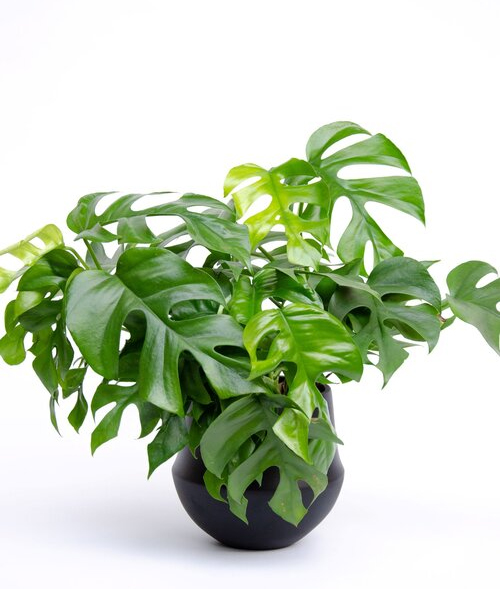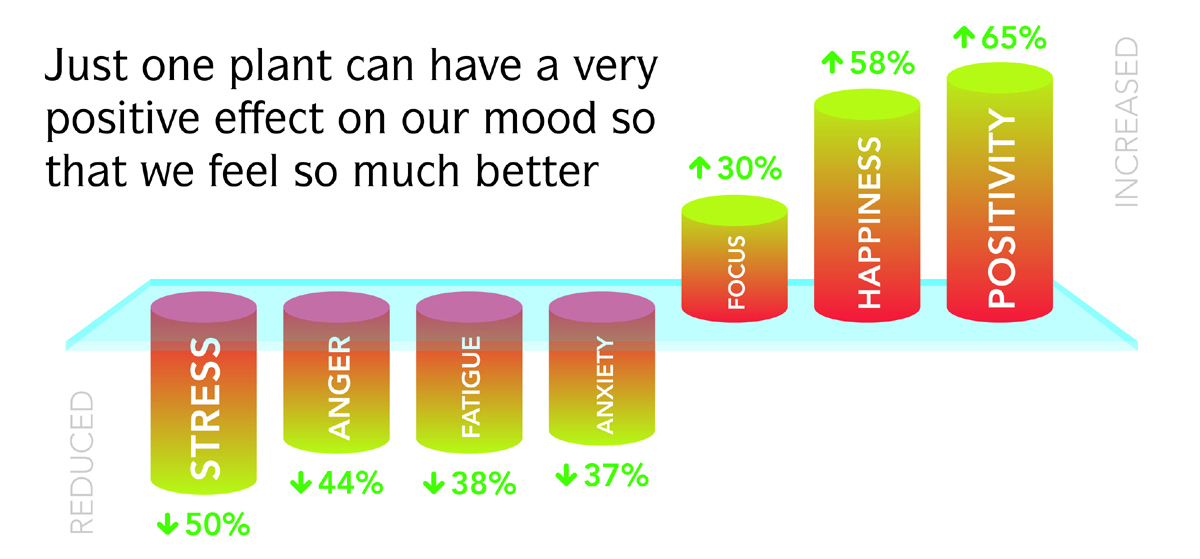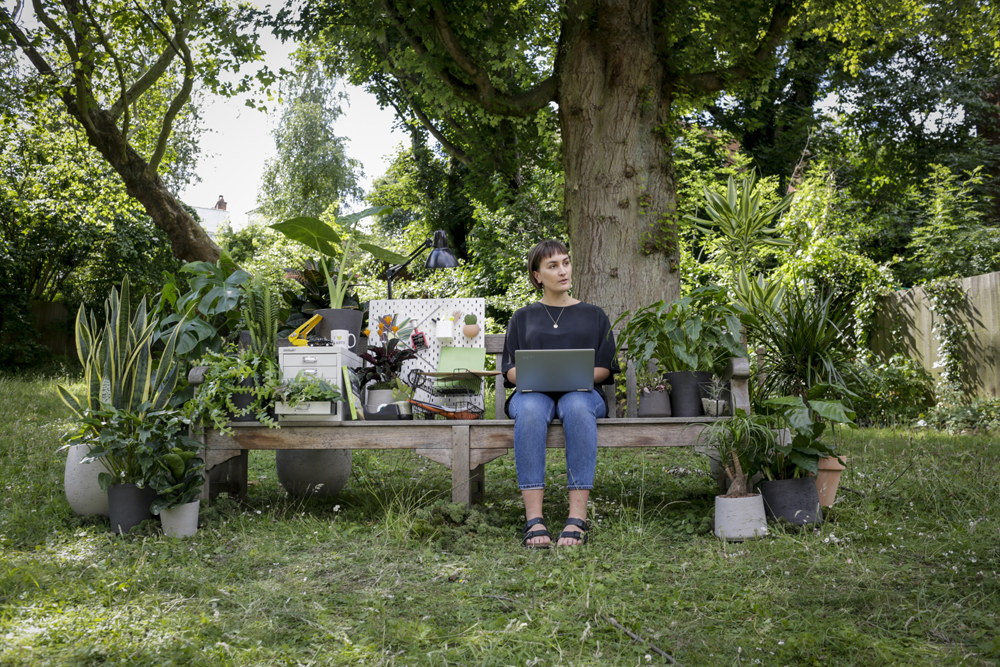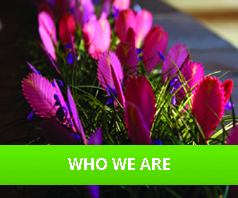Welcome to plants@work
- Industry Representation
- Great Business Opportunities
- Fantastic Training Programme
- Networking
Who We Are
News
-
Tivoli to deliver grounds maintenance services for Yorkshire Housing Tuesday, 26 March 2024
-
Nominate Your Outstanding Team Members for Recognition! Monday, 18 March 2024
-
Festive’s New Showroom in Enfield Opens on February 19th! Friday, 16 February 2024
-
Green Wall Day February 15th, 2024 Tuesday, 13 February 2024
Living is stressful during lockdowns
Living is stressful in the 21st Century - that was a section heading in our book 'Plants for Wellbeing' published in 2018. That was before we were dealing with a pandemic and lockdowns!
'Stress is like tension in a violin string. It should be just enough to make music, but not as much that it snaps the string' Unknown
The pace of life and work in the 21st Century is often stressful. Sometimes we aren't even aware what is causing us to feel stressed. But we do know that work overload can have this effect. What can we do about it?

A stress beating Mini Monstera (Raphidophora tetrasperma) - image courtesy of InTray Plants
Did you know
In 2016 -17 stress accounted for 12.1 million working days absence of 31.2 million days lost overall in the UK?
There are many ancient arts for helping us to keep calm such as meditation and yoga but not all workplaces are sympathetic to time taken for these pursuits. However giving your workplace a green presence in the form of plants or green walls can really help.
Research by Prof Virginia Lohr at the Washington State University found that plants in a room actually reduce the physical signs of stress; while Dr Tove Fjeld from Norway confirms, “Studies in this area have shown obvious links between well-being, psychological stability, stress levels, other important aspects of human life and environmental factors.
A very recent study (publiished in February 2020) in Japan found that just taking a break to gaze at a plant on your desk can reduce anxiety as Prof Margaret Burchett from The Sydney University of Technology had found and produced some interesting figures in relation to just one plant in a room.

“All these studies indicate that nature (such as plants, lakes and woods) can offer an important contribution to the reduction of stress. An urban environment, however, causes psychological stress.”
Looks like the biophilia factor is kicking in again.
More research about plants effect on stress has been carried out in Norway, The Netherlands and Australia.
Tell your stress to take a walk in the woods
People in Japan practice a form of stress reduction that is very popular, and now scientific research is proving that it works. It’s called “Shinrin-yoku,” which translates to “forest bathing,” or walking in forests in order to promote health. Before you get the idea this is Tell your stress to take a walk in the woodssome sort of ancient practice, it’s only about 30 years old. It was first suggested as a way to reduce stress by the Forest Agency of Japan, similar to the U.S. Forest Service, in 1982. In just a short time it has become a recognized form of stress management and a major relaxation activity.

When scientists started studying Shinrin-yoku to find out how it works, they determined several positive things were going on when people walked in a forest environment:
- Blood sugar levels dropped, both after short and long distance walking
- Hormonal and nervous system functions improved
- Calorie burning increased
- Blood pressure and pulse rates dropped, and heart rate variability stabilized
- Psychological before and after testing showed a significant decrease in hostility and depression score
- Stress levels were reduced. The higher the stress, the greater the effect.

Studies repeatedly show positive physiological and psychological benefits from forest walking. The worse the stress, the better the results. People in the studies and practitioners in Japan, Korea and other parts of the world report they feel 'calm', 'comfortable,' and 'refreshed.'
How exactly does Shinrin-yoku work? Scientists believe when participants walk in a forest or any dense plant landscape or garden, they breathe in volatile substances called phytoncides which are anti-microbial essential volatile organic compounds derived from plants. Phytoncides prevent plants from being eaten by animals and insects and prevent attacking organisms from taking hold that will rot the plants. Spices, onions, garlic, tea tree, oak, cedar, pine and citrus fruits give off these substances. These are all strong identifiable scents that most human beings enjoy under the right circumstances.
It doesn’t really take a scientific study to understand that it’s good for our health to get outside, breathe in the oxygen rich air produced by a forest while taking a brisk walk. We enjoy the natural aromatherapy, and we are free of the damaging blue light of our electronic devices assuming you don't have your phone out! Shinrin-yoku calms all the damaging sympathetic nerve activity, the same way any form of meditation does.
The 30 minute prescription: getting in touch with nature
John Muir: "Everybody needs beauty as well as bread, places to play in and pray in, where nature may heal and give strength to body and soul."
According to a self-study research carried out at the University of Queensland and published at the beginning of 2016, just 30 minutes per week spent enjoying nature is the perfect green prescription. Just sitting on a park bench or similar, as long as you aren't looking at your phone or other mobile device, will have enormous benefits for your mental and physical wellbeing.
The study found that this prescription could decrease chances of developing depression and high blood pressure. The study involved more than 1,500 people living in Brisbane, Australia.
“Specifically, our results suggest that up to a further 7% of depression cases and 9% of high blood pressure cases could be prevented if all city residents were to visit green spaces at least once a week for an average duration of 30 minutes or more,” the researchers report in the study.
According to Dr Richard Fuller, one of the study’s co-authors, “We’ve known for a long time that visiting parks is good for our health, but we are now beginning to establish exactly how much time we need to spend in parks to gain these benefits. We have specific evidence that we need regular visits of at least half an hour to ensure we get these benefits.”

If visiting a park or green space isn't possible at this time, why not create an urban jungle indoors with houseplants? It's the new way for new plant lovers who just can't stop collecting - just one visit to Instgram will prove this.
- Tags: #Lockdown3, Plants for less stress













